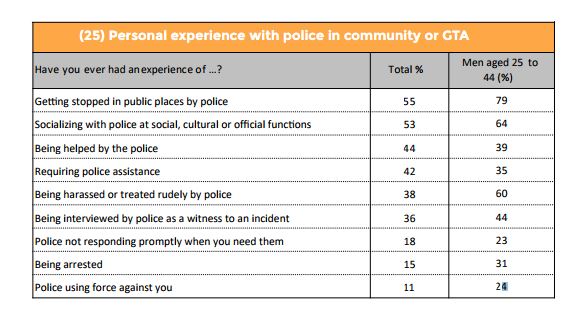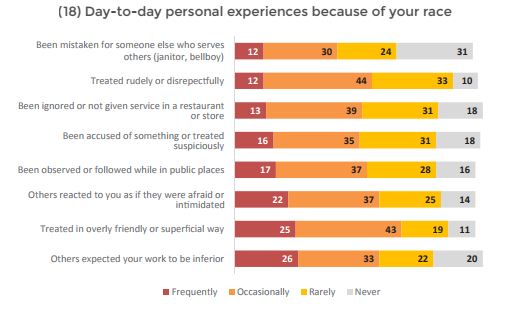Nearly 80 per cent of black men between the ages of 25 to 44 say they’ve been stopped by police in public, according to a wide-ranging survey on black experience in the Greater Toronto Area.

Overall, 55 per cent of black GTA residents surveyed reported being stopped by police at some point, the Black Experience Project report found.
The research study launched seven years ago with the aim of providing insight on what it means to be black in Toronto as well as Durham, Halton, York and Peel regions.
Just over 1,500 black-identified people were interviewed in the 250-question survey released on Wednesday, which tackled 10 themes including identity, community, personal aspirations, education, health and employment, as well as interactions with institutions such as law enforcement.
“As much as so much of this survey was really shedding light on what we know, to the larger degree, to be true, there was also a hopefulness on change and how that can take place, and what people’s aspirations are whether it be around the justice system or the education system,” Marva Wisdom, director of outreach engagement for the project, told AM640 host Tasha Kheiriddin on Wednesday.
LISTEN: Marva Wisdom joins the Tasha Kheiriddin Show on AM640
The survey found that nearly a quarter of black men in the 25 to 44 age group reported that police have used force against them, and 60 per cent reported harassment or being treated rudely by police.

Get breaking National news
“These negative encounters with police services – including ones involving harassment and the use of force – are irrespective of levels of education, income adequacy, or employment,” the study’s authors noted.
At the same time, 85 per cent said they believed their local police force does either a good or average job at maintaining public safety, but 54 per cent said officers perform poorly at treating black people fairly.
Various police forces in the GTA were supporters of the study, something Wisdom says is a positive sign.
“For me, that is a sense of hopefulness that they recognize that things have to be done and they’re ready to really listen to the hard facts that are coming out today and at other times,” she said.

The study also found that two-thirds frequently (18 per cent) or on occasion (49 per cent) experience unfair treatment because of their race. Eighty per cent said they deal with micro-aggressions such as being followed in public places and being treated with rudeness or suspicion.

In the education section of the survey, only half of those schooled in Canada said the classroom was a “welcoming and friendly place.”
The Black Experience Project is led by Environics Institute for Survey Research in partnership with the United Way (Toronto and York Region), the YMCA of the Greater Toronto Area and Ryerson’s Diversity Institute, among other groups.
“The results are intended to provide valuable insight and direction in identifying policies and other initiatives that will contribute to the health and vibrancy of the black community, and by doing so, the health and vibrancy of the entire GTA community and beyond,” the project’s website states.
The next phase of the project will deal with recommendations based on the data collected.
- Mailing in your taxes? CRA says changes are coming amid push to digital
- ‘Really challenging issue’: Many B.C. communities still at high risk for flooding
- Canadian military member arrested, charged in foreign interference probe
- Cold warnings across the Prairies forecast wind-chill temperatures near -45 C












Comments